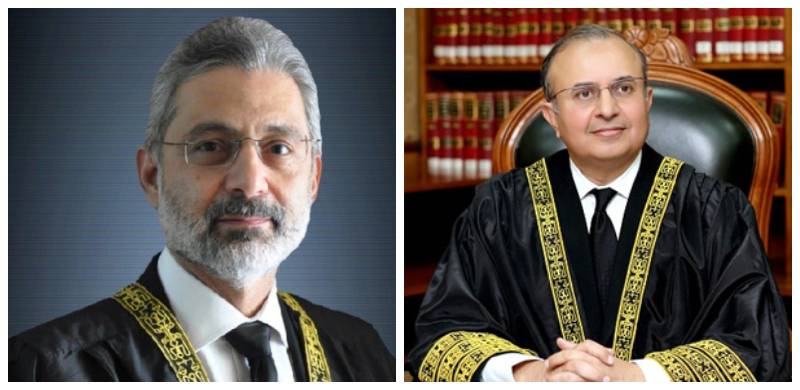By Staff Reporter
ISLAMABAD: The senior puisne judge Justice Mansoor Ali Shah snubbed a Supreme Court (Practice and Procedure) committee meeting, in a sign of judicial tensions, over the constitutional validity of recent amendments made through an ordinance.
President Asif Ali Zardari signed the Supreme Court (Practice and Procedure) Amendment Ordinance 2024 into law last week, limiting the powers of Pakistan’s senior judiciary.
The law, passed by parliament last year but blocked by the top court, regulates Supreme Court affairs and introduces changes to suo moto proceedings. It requires benches to identify questions of public importance and fundamental rights through reasoned orders and undermines the court’s ability to initiate cases of public importance.
The legislation alters the composition of the Supreme Court committee responsible for bench formation, now headed by the Chief Justice, accompanied by the senior puisne judge and any other apex court judge nominated by the Chief Justice.
The law’s passage follows a prolonged government-judiciary tug-of-war. The Supreme Court (Practice and Procedure) Act 2023, passed in April 2023, was stayed by an eight-member bench.
The move underscores deepening divisions within the judiciary ahead of Shah’s scheduled oath-taking as Chief Justice on Oct. 26.
“The concentration of ultimate administrative powers in the hands of a single individual, such as the Chief Justice, runs counter to the ideals of democratic governance and judicial fairness,” Justice Shah said in a letter.
“Embracing collegiality in administrative decisions ensures that the court’s functioning transcends the outdated notion of a ‘one-man show’, reflecting a more inclusive, transparent, and equitable judiciary that truly serves the public interest.”
Justice Shah expressed concerns over Justice Munib Akhtar’s exclusion and questioned the nomination of the fourth senior-most judge instead.
“Furthermore, no reasons were given why the next senior most judge was ignored and instead, the fourth senior most judge was nominated as a member of the committee.”
“I am afraid, any proceedings taken or decisions made by the reconstituted committee will go against the Full Court Bench decision of this court in Raja Amer and will undermine the integrity of the highest institution of justice in the country as well as the public confidence in the decisions made by the Benches constituted by it,” Justice Shah said.
“Therefore, I am of the firm view that until the constitutional validity of the amendments made by the amending Ordinance is determined by the Full Court Bench of this Court, or the judges of this Court resolve to act upon the amendments in a Full Court meeting on the administrative side, or the earlier Committee is restored by the Hon’ble Chief Justice by nominating and including the second senior most judge of this Court, I, with respect, regret that I cannot participate in the meetings of the Committee.”
Shah also recalled the Chief Justice Qazi Faez Isa’s previous stance on collegiality and transparency, citing the Raja Amer case.
“The Chief Justice so firmly believed in the collegiality and transparency introduced by the Act that, as a Senior Puisne Judge, he recused himself from sitting in any Bench and opted for chamber work for several months.”
Shah also addressed a bitter spat between judges reflected in the detailed judgment on reserve seats issued on Monday, responding to dissenting notes by Justice Aminuddin Khan and Justice Naeem Akhtar Afghan.
“We feel constrained to observe, with a heavy heart, that our two learned colleagues in the minority… have made certain observations in their dissenting judgement of Aug 3, 2024, which do not behove judges of the Supreme Court of Pakistan, the highest court of the land, regretted Justice Shah. `We take no issue with their having and expressing the view that, in their understanding, our order dated 12 July 2024 is not in accordance with the Constitution, as members of a bench of this court, or any court, can legitimately differ on issues of fact and law… However, the manner in which they have expressed their disagreement falls short of the courtesy and restraint required of judges of the superior courts.”
“What is more disquieting is that…they appear to have gone beyond the parameters of propriety by warning the 39 plus 41 (80) returned candidates and urging the commission not to comply with the majority order… Such observations undermine the integrity of the highest institution of justice in the country and seem to constitute an attempt to obstruct the process of the court and the administration of justice.”
“The judges need not always see eye to eye and may ultimately disagree, but the possibility of disagreement does not absolve them from engaging in a free and frank discussion before rendering their final opinion,” Justice Shah said.
“Egos may be bruised, tempers tempted, yet all must pursue the process with respect and civility.”
Copyright © 2021 Independent Pakistan | All rights reserved




